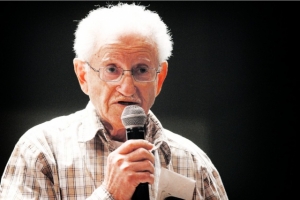Holocaust survivor speaks at Mount Olive College
By Josh Ellerbrock
Published in News on April 10, 2013 1:46 PM

News-Argus/TROY HERRING
Holocaust survivor Abe Piasek tells his story of survival to a packed house at Southern Bank Auditorium on the campus of Mount Olive College early Tuesday afternoon.
MOUNT OLIVE -- The day Abe Piasek was freed from the hold of Nazi Germany still sticks in his memory -- not so much because he escaped from an overturned cattle car that day, but because it was the first time he ever saw a black man.
A series of bombing runs by Allied forces had stopped the train that he and hundreds of others were riding to a Nazi concentration camp, and when the doors were opened, Piasek saw a tank with an American flag. He, however, assumed the Ol' Stars and Stripes was an African flag because the first thing he saw was a black man emerging from the tank's cockpit.
"I see a tank battalion coming. I had no idea who they were, and they opened up the turret on the tank, and black people coming out. I said 'Oh my god, who are they?' I never saw a black person before. We looked closer on the tanks and saw the American flag, and we said, they must be from Africa. We had no idea what a black person looked like."
As part of the Holocaust Remembrance Day on Tuesday, Mount Olive College hosted Polish-born Abe Piasek, one of the few remaining survivors of the Holocaust.
Piasek's story started at the age of 11 when he first entered a ghetto with his family in 1940. He related the disappearances of neighbors, the blatant murder of friends and a general worsening of conditions.
By the time he was 12, Piasek was handed over to the Nazis as part of a mandate that forced Jewish families to give at least one family member to the government. His father had already disappeared. His mother was bedridden, and instead of giving his sister, his uncle decided to give the young Piasek.
The next six years saw a life of little food (his daily diet consisted of a slice of bread, a cup of coffee and some soup), hard work (building railroads and assembling weapons) and the deaths of those around him as he was shuffled from concentration camp to concentration camp.
Throughout those years, Piasek never took a shower and had one set of clothes -- a set stiff with oil and sometimes infested with lice. He usually had no idea where the Nazis decided to take him next. He didn't know what was going on outside of his camps.
But somehow he survived despite being one of the youngest and one of the shortest people at the camps he belonged to. There were many close calls. Sometimes, a pair of brothers would hitch him up to look taller as Nazis culled the shortest from every group. And despite sleeping next to dead bodies piling up from typhoid fever, he never caught the sickness.
He spent time at Auschwitz, saw the bodies piled in the gas rooms and smelled the pork-like odor of burning human flesh.
But as he recounted his story, Piasek -- an old, short man with a Polish accent and a fuzz of white still lingering on top of his head -- saved his prouder moments for last.
From out of the horror of seven years of bare survival, Piasek was given a chance to move to America in 1947 and start a new life on the cusp of manhood. He became a baker in Connecticut, met his wife and started his family. He had a son and a daughter, and they grew up smart and have successful careers.
Piasek served his new country by volunteering for local organizations, which gained him certificates of service from both former President George W. Bush and current President Barack Obama.
And eventually he decided to tell his story. In his front shirt pocket, he carried a letter given to him by Steven Spielberg thanking him for telling his story to the director when researching "Schindler's List." (Piasek met Oskar Schindler briefly but was never the recipient of his work.)
Piasek, now 84, lives in Raleigh. His speech, in a packed Southern Bank Auditorium on the Mount Olive College campus, was part of a number of events at the college focusing on remembering the Holocaust and ended with students and residents packing 10,000 meals for "Stop Hunger Now."
Piasek has considered writing a book on his experiences, but says he probably won't because he isn't a good writer and never went to college. Instead, he said, he is going to leave it to his grandson who will have recorded files from his grandfather telling his many experiences during talks like the one at Mount Olive College.
